Coronavirus in Istria: Cafes, Restaurants to Close for Month
As Index writes on the 14th of March, 2020, the Civil Protection Headquarters in Istria held a press conference in Pula about the ongoing situation with coronavirus in Istria.
The headquarters said police and sanitary inspections are checking that citizens are properly complying with self-isolation instructions and are imposing penalties on those individuals if they fail to comply.
Coronavirus in Istria will see cafes and restaurants close their doors to the public for one month.
Chief of Staff Dino Kozlevac said that new measures will be come into force tomorrow, meaning they will be fully effective from March the 15th, 2020, and that shopping centres must also make sure to adhere to the instructions that have been issued.
They must control how many people enter the centres at one, and lines must be drawn up at the cash registers to indicate how far people have to keep away from each other.
The centres will be allowed to operate until 18:00 only, as will grocery stores, petrol stations and smaller shops operating within petrol stations.
All hospitality facilities will be closed until April the 14th, 2020. Hairdressers and similar places will also need to cease to operate until April the 14th, 2020.
Food delivery services and soup kitchens may be allowed to continue their operations.
At the end of the press conference, they said that they weren't prepared to just wait for the situation to become worse and that they want to tey to prevent the situation from worsening beforehand.
Kozlovec said about 1,000 people in Istria County are under self-isolation measures and that some of them aren't respecting self-isolation and have just been walking around as normal, so the police have started going out and controlling them.
Make sure to follow our dedicated page for more on coronavirus in Istria and Croatia.
Croatia Self-Isolating Since 1377: Dubrovnik, the Birthplace of Quarantine
March 14, 2020 - As the buzzwords of quarantine and self-isolation take hold, where did the concept of quarantine come from? Like many progressive things in life, from the very home of Kings Landing - Dubrovnik.
Croatia really is the most amazing country to live in.
One of the things I love most about it is the constant discovery, and there is perhaps no other country in the world which has contributed inventions and discoveries per capita as Croatia has done.
The contributions of Nikola Tesla (an ethnic Serb born in Smiljan in modern-day Croatia), as well as inventions such as the pen, the cravat and the parachute are well-known, but I was also surprised to find in my research last year that Croats were also responsible for things as varied as laminate flooring, SMS parking payments, the electric speedometer, and diazepam and other tranquillisers (boy, could I use some now).
And quarantine.
Quarantine was first introduced in 1377 in Dubrovnik on Croatia’s Dalmatian Coast, and the first permanent plague hospital (lazaretto) was opened by the Republic of Venice in 1423 on the small island of Santa Maria di Nazareth. You can read more in the academic study - Lessons from the History of Quarantine: from Plague to Influenza A.
The Dubrovnik Republic was a great trading power and very progressive, abolishing slavery more than 600 years ago, for example.
Croatia is also home to another European first, as the birthplace of organised tourism in Europe on the island of Hvar in 1868, when the legendary climate of Croatia's premier island proved a popular destination for the convalescing aristocrats of the Austro-Hungarian Empire, and health tourism on the island which came to be known as the Austrian Madeira became extremely popular.
Here's hoping that the period of quarantine and self-isolation is short, and we can all soon resume those holiday plans for the glistening waters of the Adriatic.
For the latest on the coronavirus situation in Croatia, check out the dedicated TCN section, or learn more about Croatia's famous inventions and discoveries.
Croatian Government Revealing Package of New Measures Next Week
As Poslovni Dnevnik writes on the 14th of March, 2020, Prime Minister Andrej Plenkovic recently held a Croatian Government meeting on the activities being undertaken to combat the current coronavirus epidemic in Croatia.
"In principle, I think there's satisfaction with the way Croatia is trying to solve these problems," Plenkovic said after the meeting, N1 reports.
He added that the opposition's proposals and comments were largely in the wake of what the Croatian Government was already doing.
''Each of the ministers talks to the groups for which he is responsible, from trade, transport, tourism. Next week, we will come out with a package of measures, and some of them will require legal changes, which will be put into an urgent procedure,'' Plenkovic said, adding that he had a number of measures and would later announce when they would come into force.
"The departments are working all weekend, and will work on Monday. We want the Croatian Government to take concrete measures,'' Plenkovic said.
Journalists asked the Prime Minister how concerned he was about the economic situation the country is now facing owing to the coronavirus outbreak.
"Croatia is facing this crisis in a situation of consolidated public finances. It comes at a time when you have a government that can responsibly manage public finances, we have a balanced budget. We'll take measures to reduce the effects of this crisis,'' Plenkovic said.
"This is a situation that requires serious measures at a personal level and at the level of measures we're taking as a government," he added.
Asked if schools was closed due to public pressure, Plenkovic said that pressure wasn't the reason for the Croatian Government decision on school closures, but that in the case of Istria, where many people go over to work in nearby Italy, safety steps needed to be taken.
Make sure to follow our dedicated section for rolling information on coronavirus in Croatia.
How is Split Preparing for Self-Isolation? A Saturday Shopping Trip in Photos
March 14, 2020 - Experts say that panic surrounding coronavirus can be more dangerous than the virus itself. Amid news of panic Croatian supermarket buying, TCN visits supermarkets in Split to see the realities on the ground.
After Croatian Prime Minister Andrej Plenkovic announced that schools would close for two weeks from Monday and that citizens should strictly follow the measures in place to stop the spread of the coronavirus, Croatians kicked into self-isolation gear all over the country.
With this comes the obvious hysteria, which resulted in stories of panic buying around the country. While Croatia didn’t exactly follow the route of Australia, where toilet paper became nearly impossible to find, it was interesting to see how Croatian shoppers chose to prepare for a few weeks in solitude.
After we had a look into how the citizens of Varazdin equipped themselves on Friday, I thought I’d set out for my big shop on Saturday to my neighborhood supermarkets in the Firule area of Split.
I began at Tommy up the street, primarily to stock up on cat food for my furry friends at home.
There had been speculation that the meat shelves would run dry this weekend, and based on this Tommy supermarket, it was true.
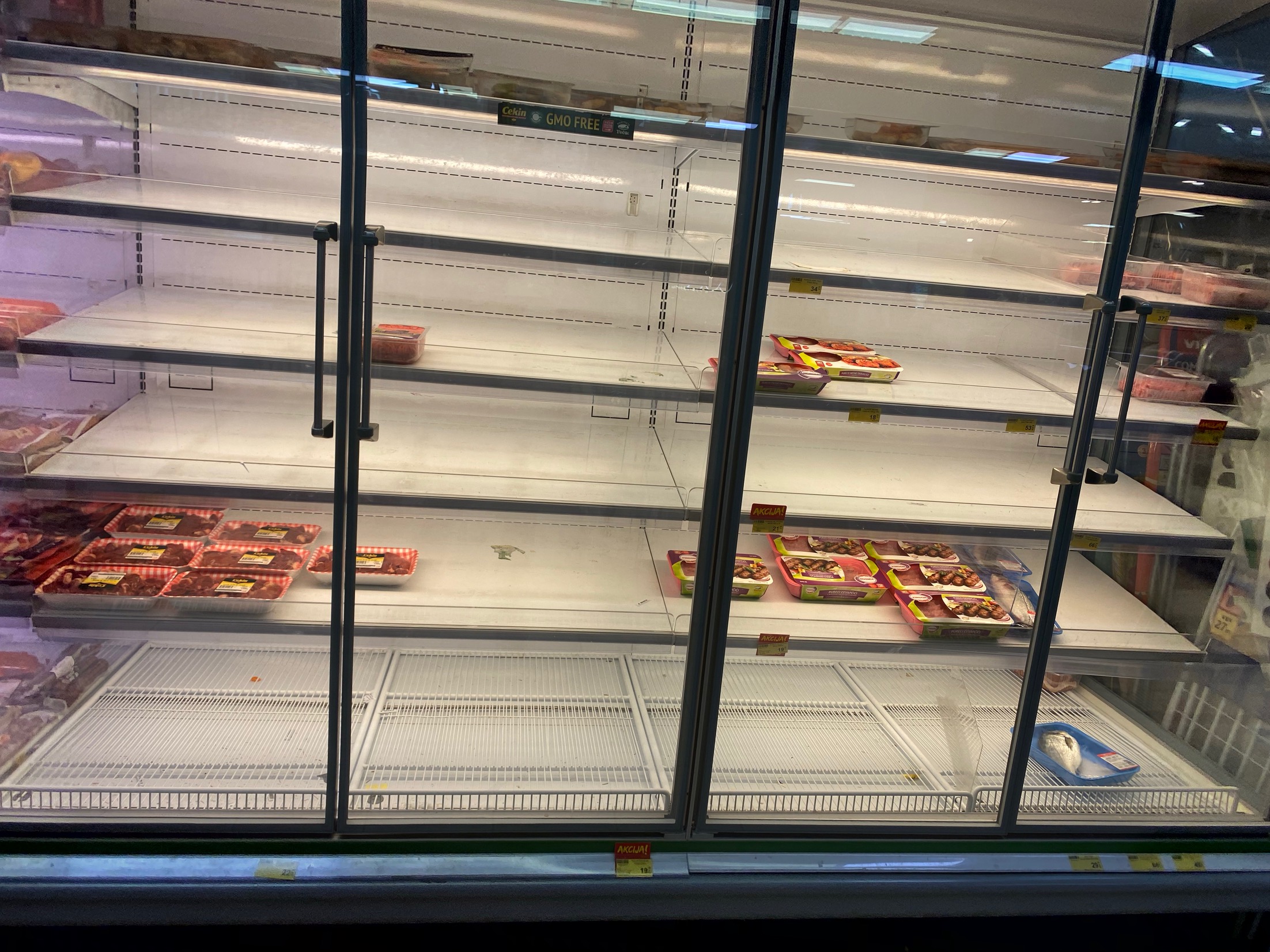
Toilet paper, however, was fully stocked.
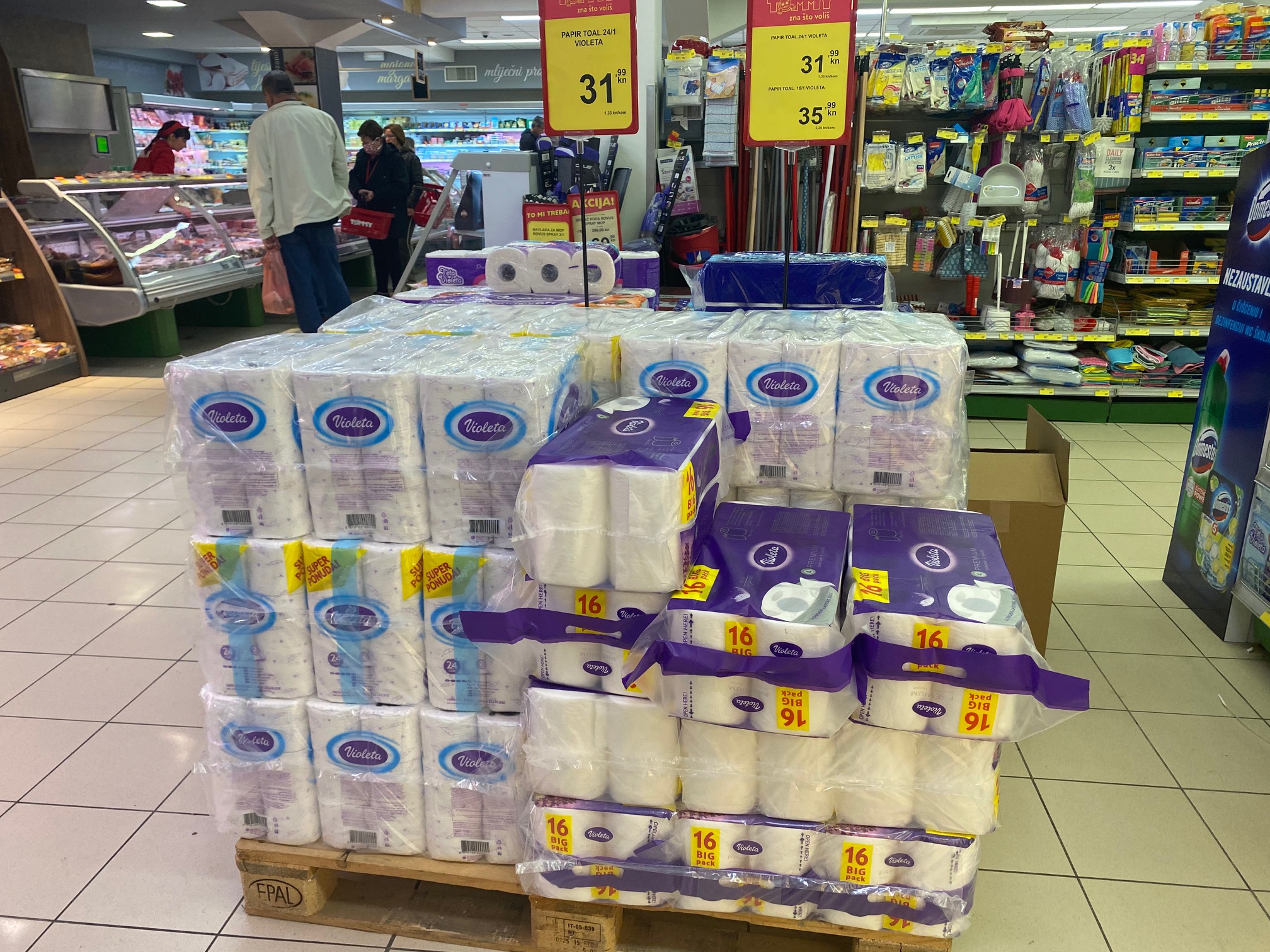
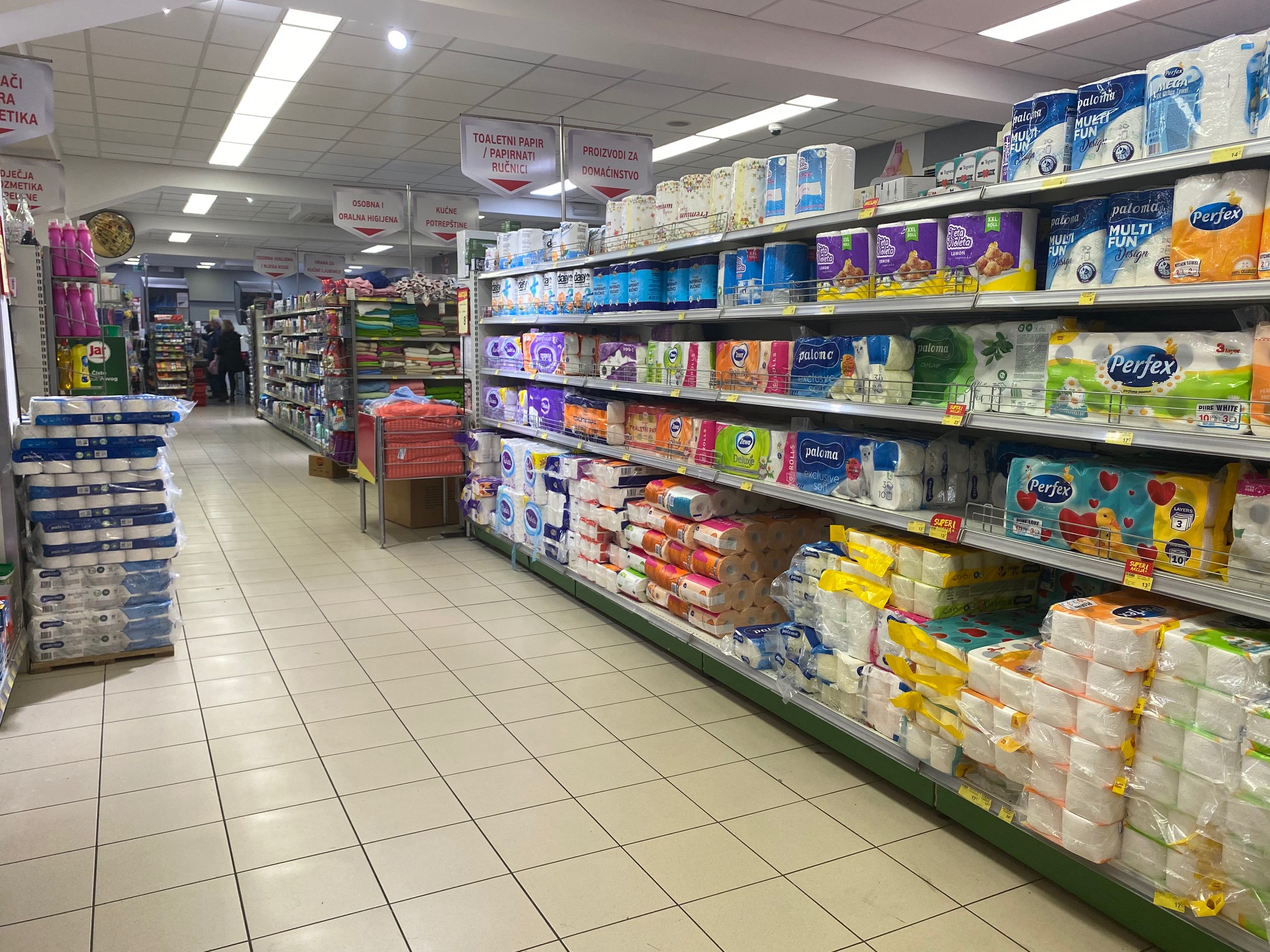
In the United States, pasta shelves emptied quickly. The selection of Barilla was only a bit thinner than usual at this Split Tommy.
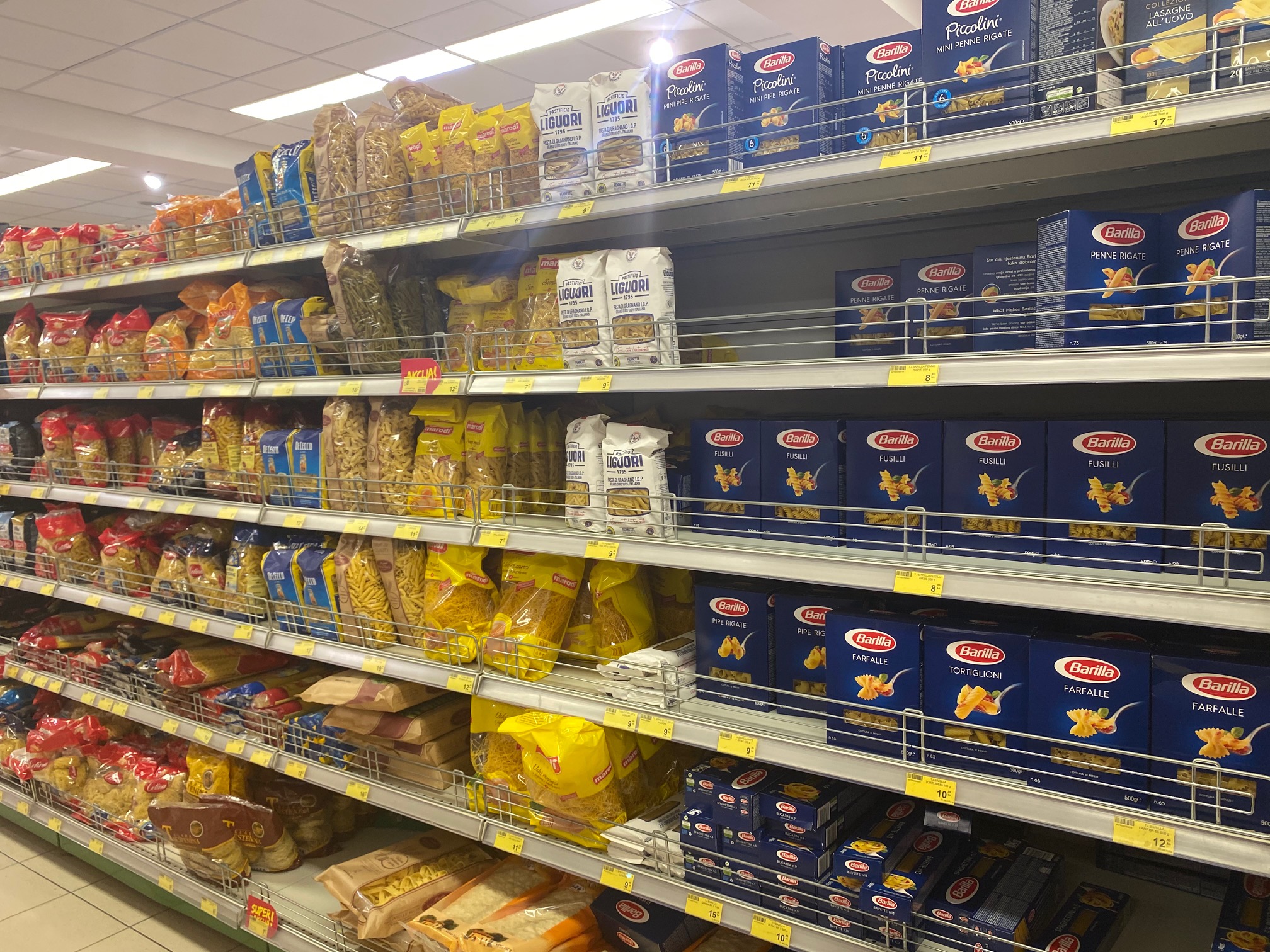
Frozen goods also took a small hit, with fish products the most popular items missing.
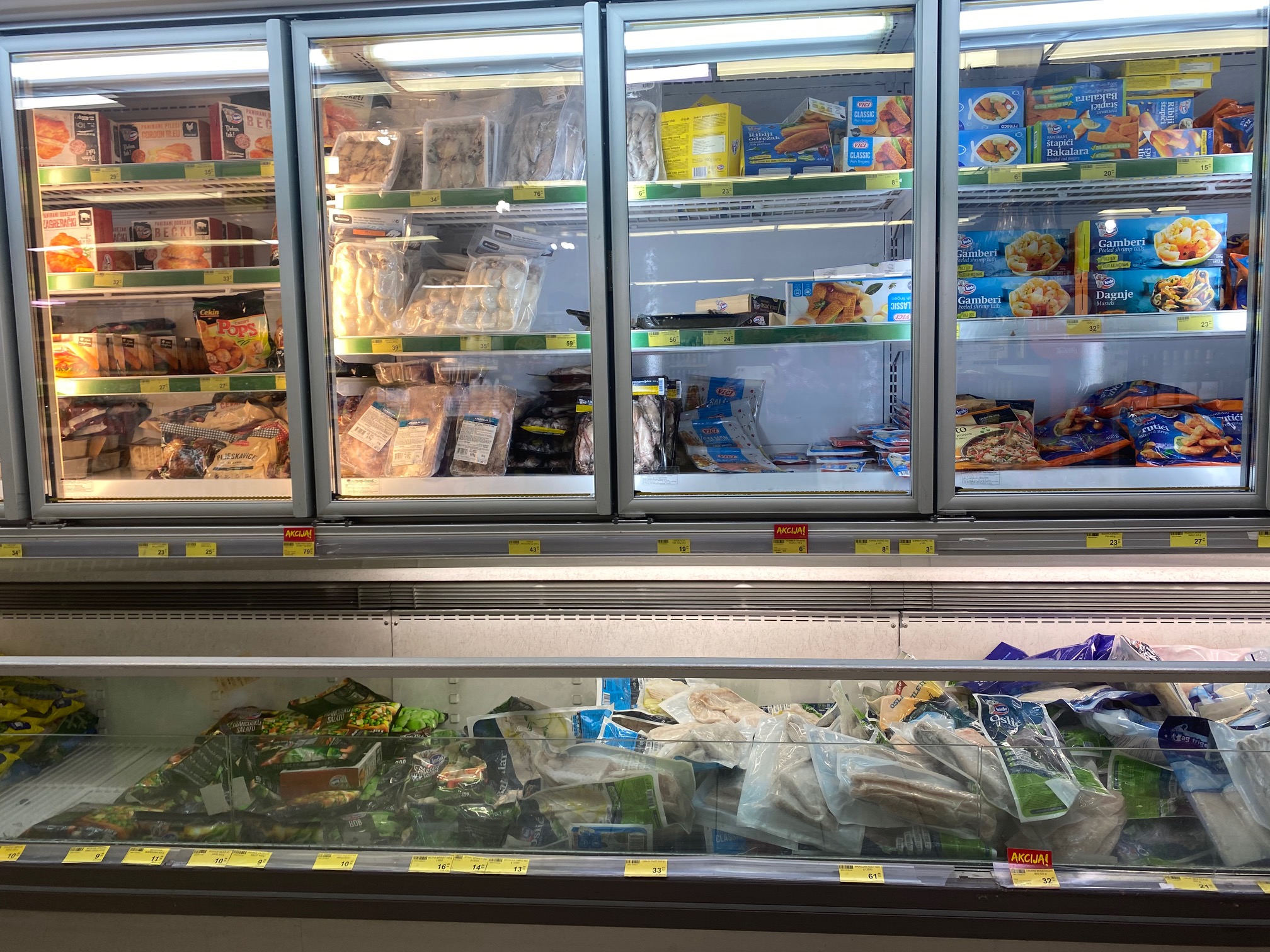
Tommy had a sign at the register asking all customers to stand one meter apart.
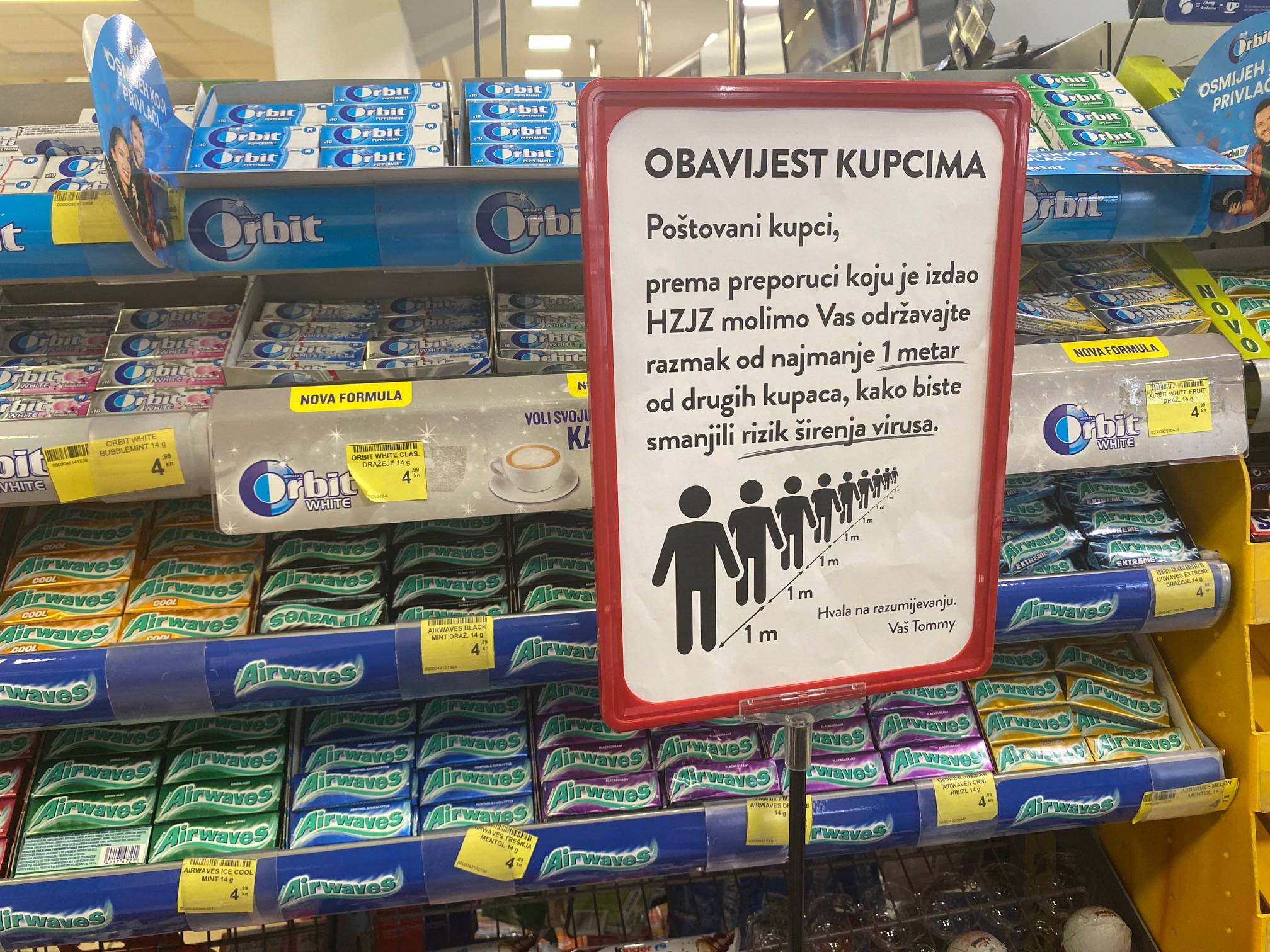
Next up was DM, where toilet paper, paper towels, and tissues were mostly lacking.
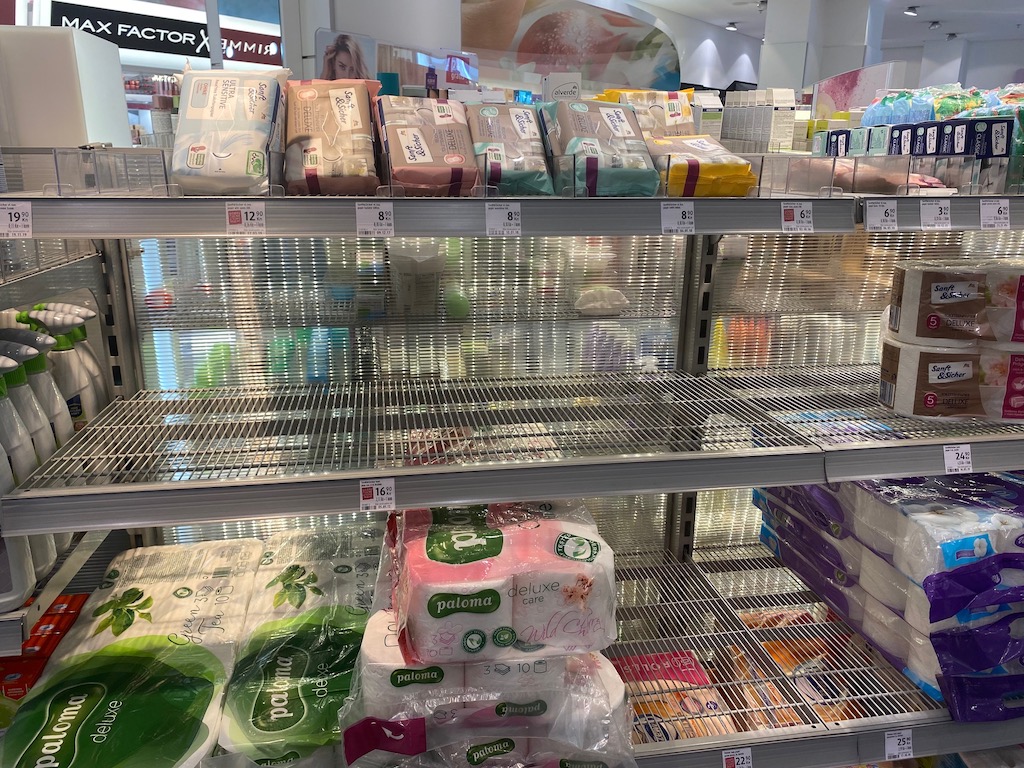
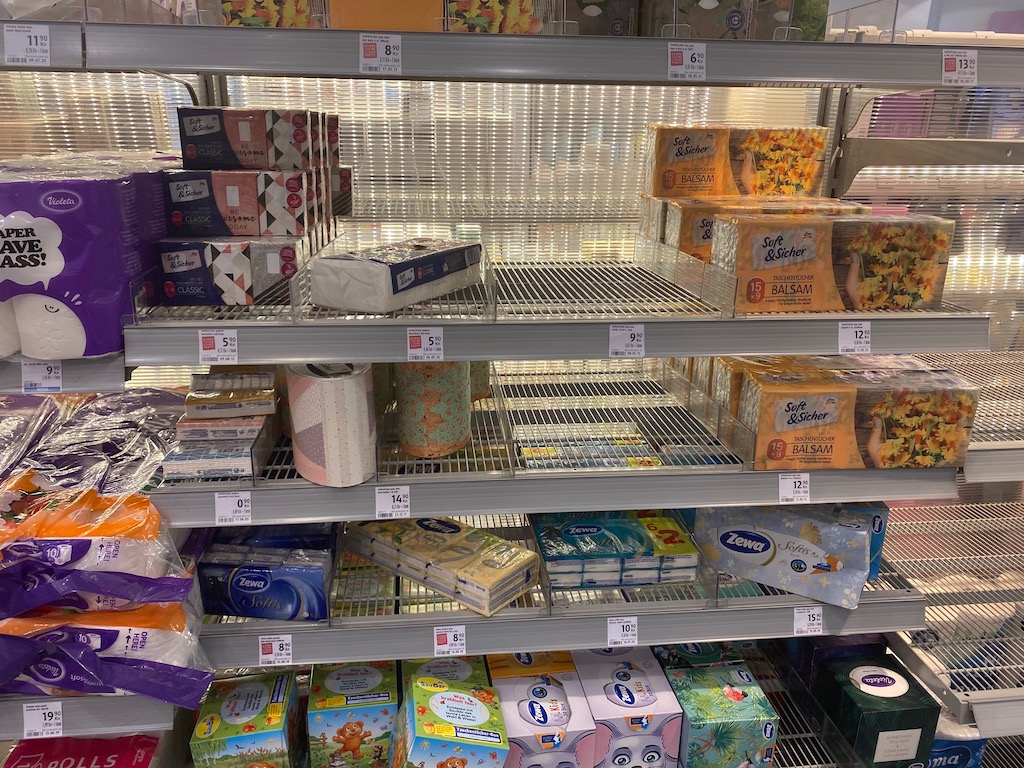
And you'd be lucky to find soap and antibacterial sanitizer near the checkout.
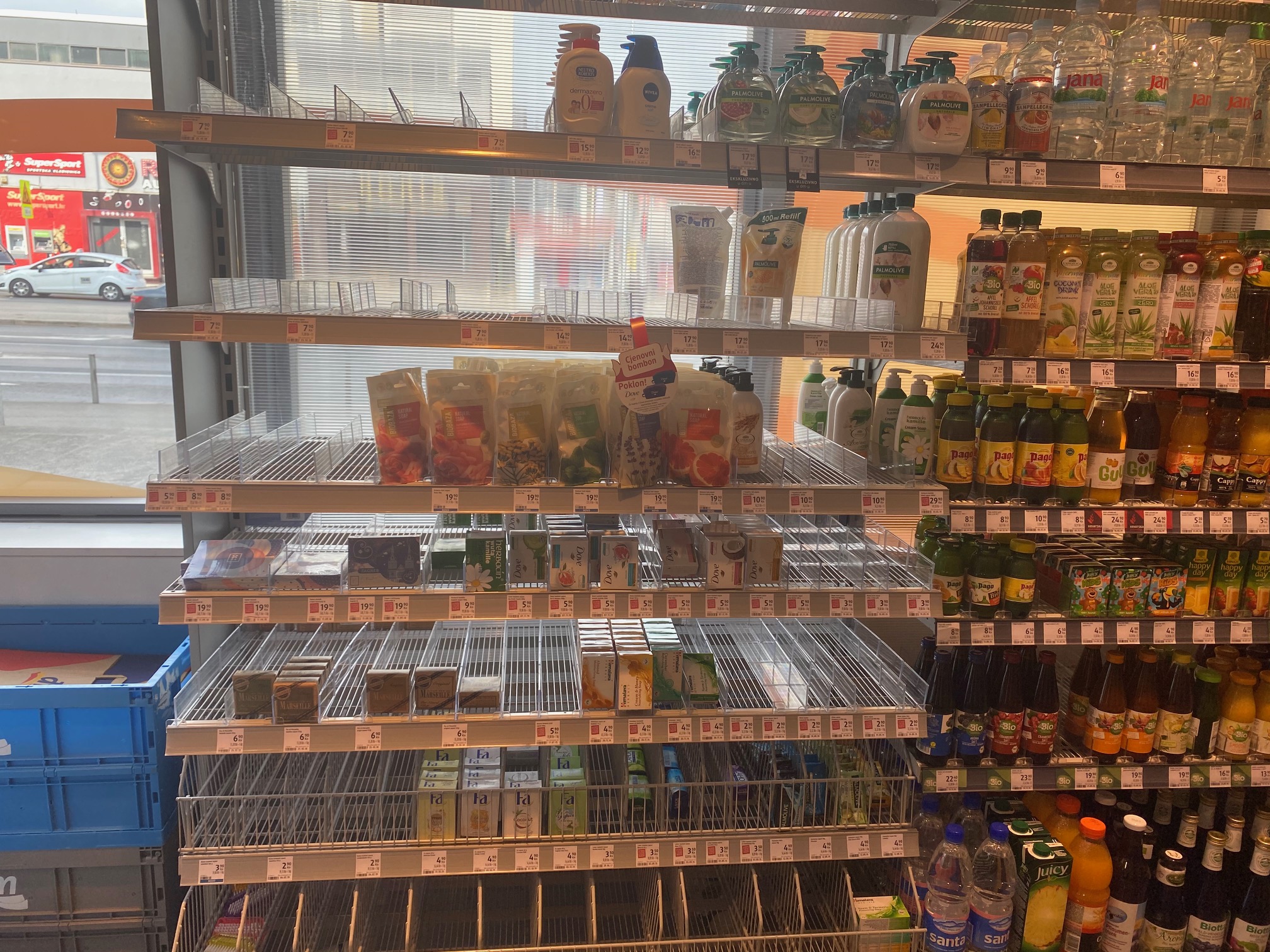
Spar was my final stop, where clerks actively resupplied the aisles with food items.
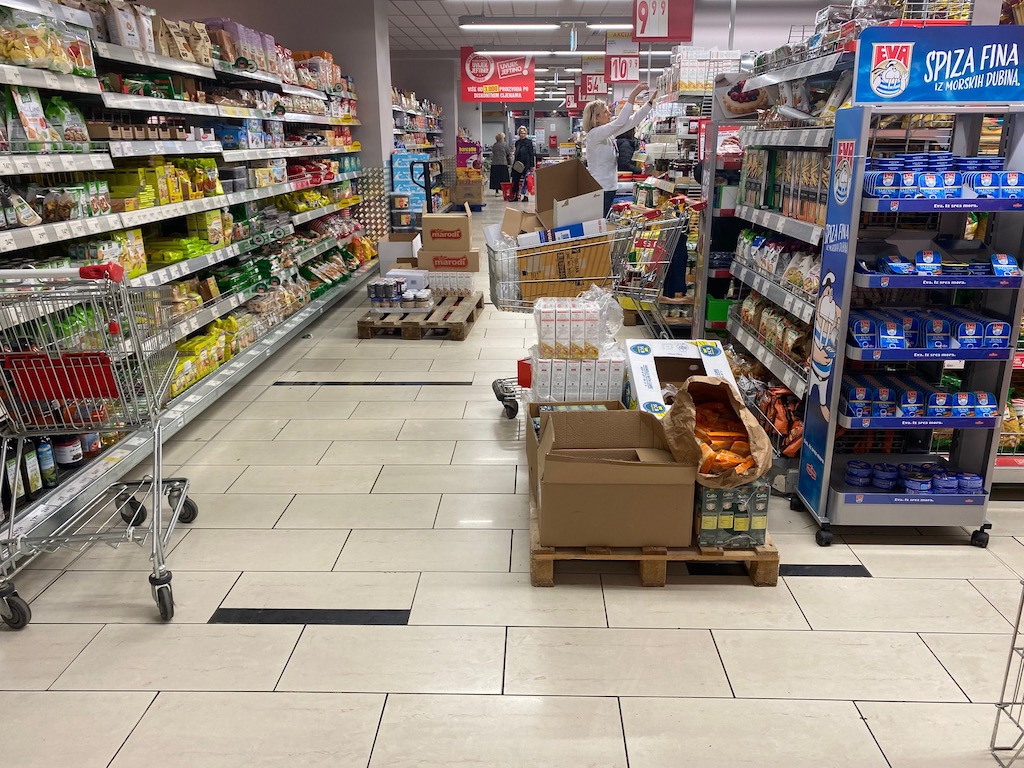
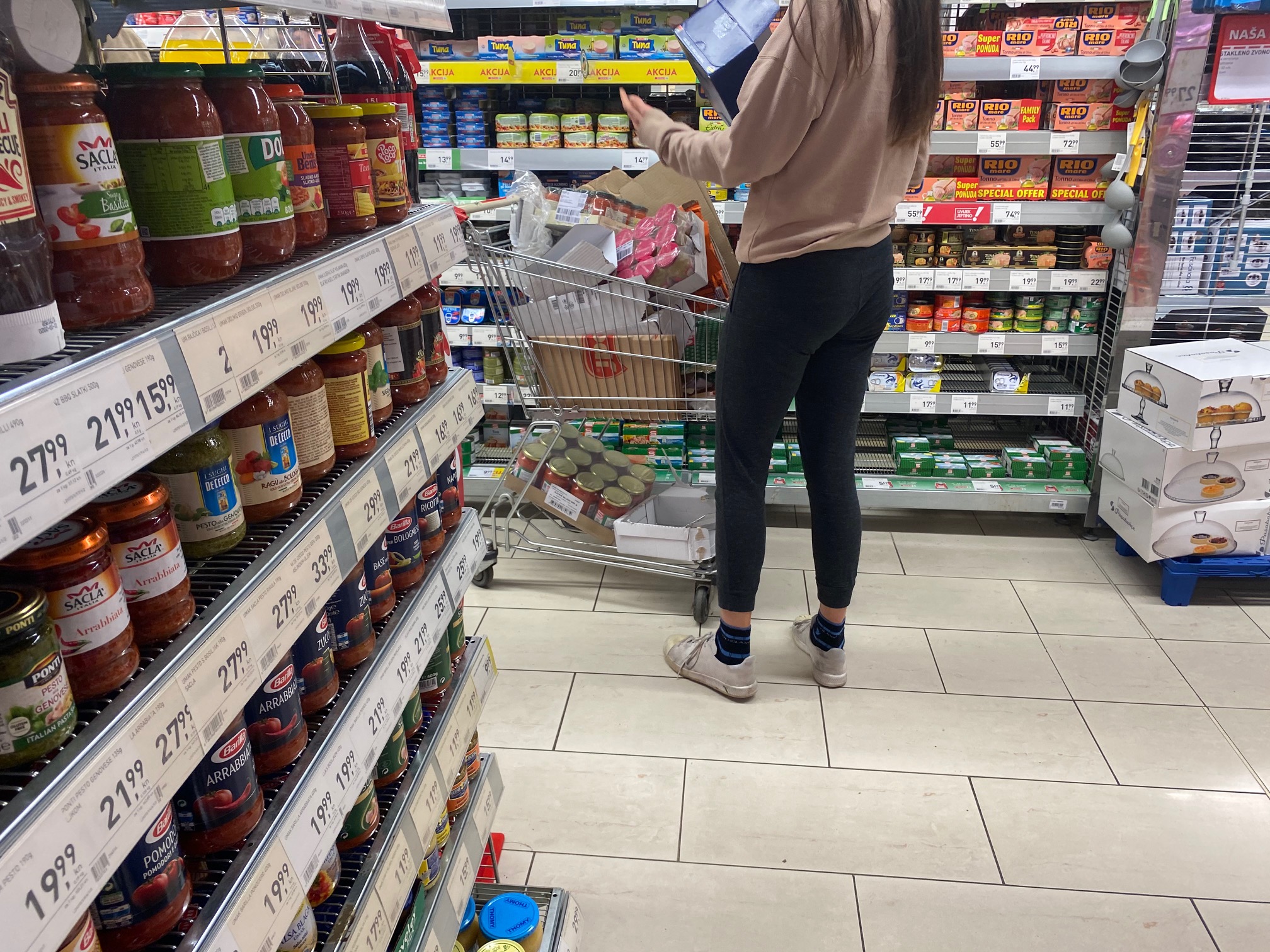
Red apples and lemons were on the low side, however.
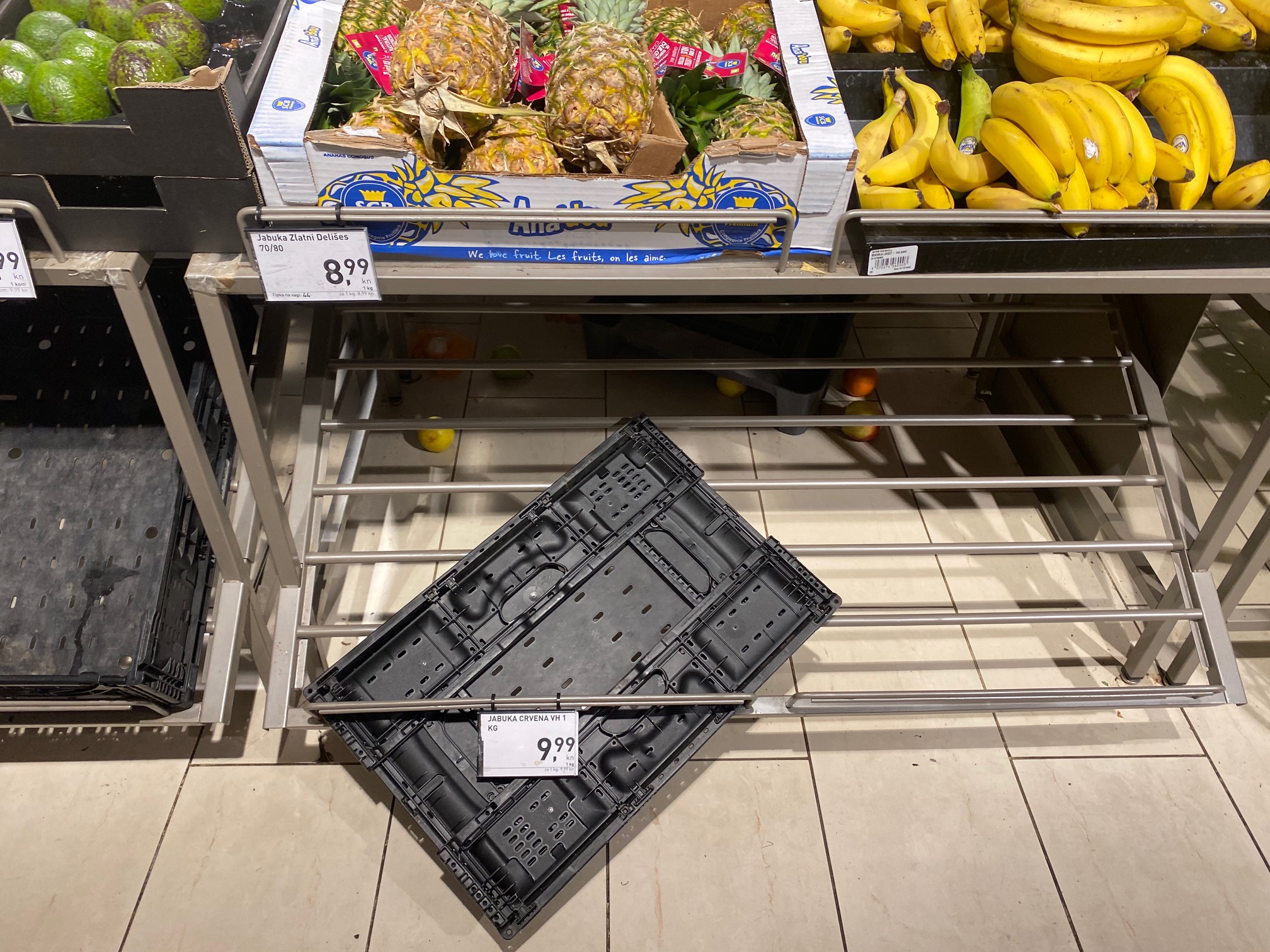
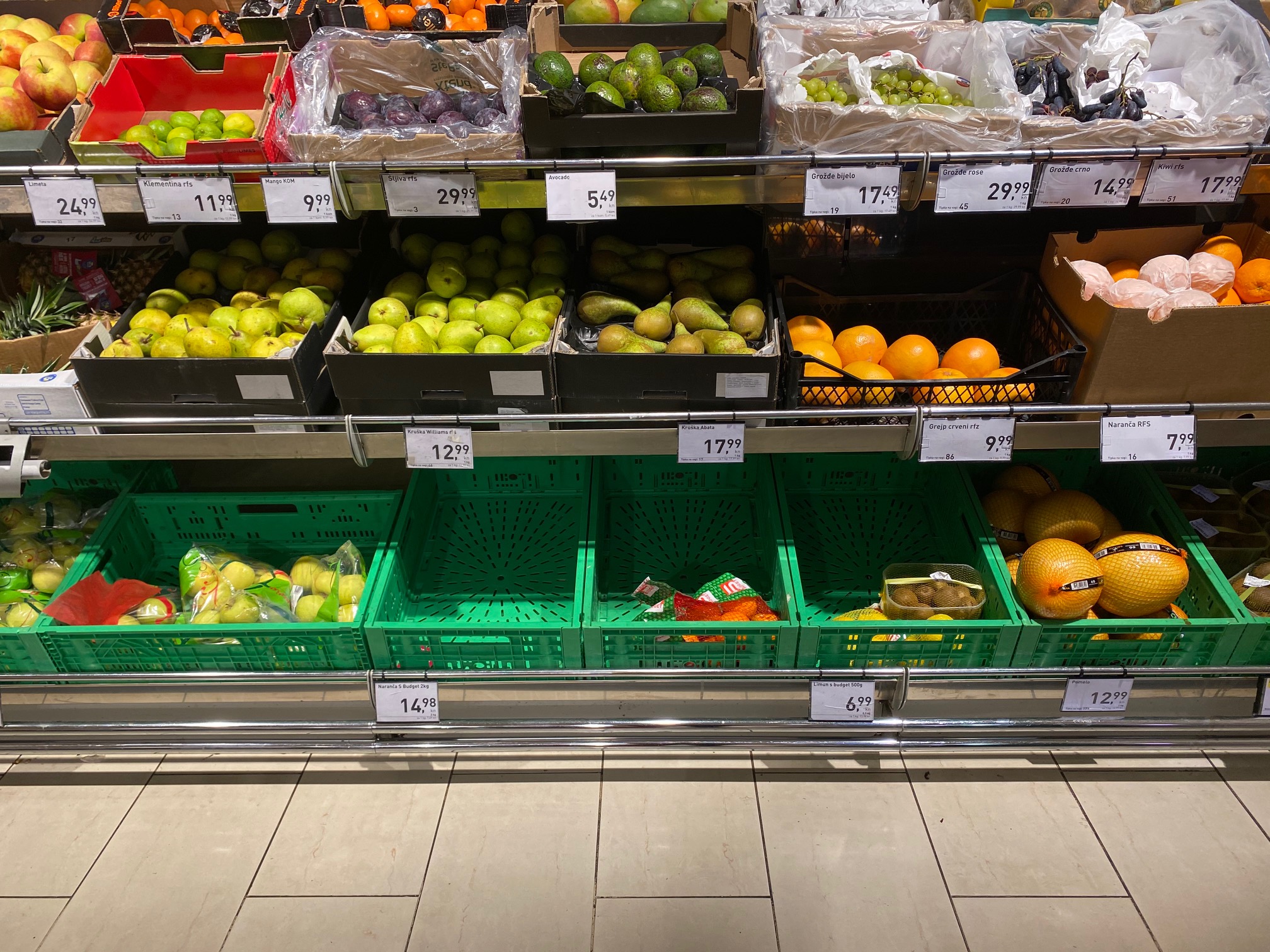
But toilet paper was on sale!
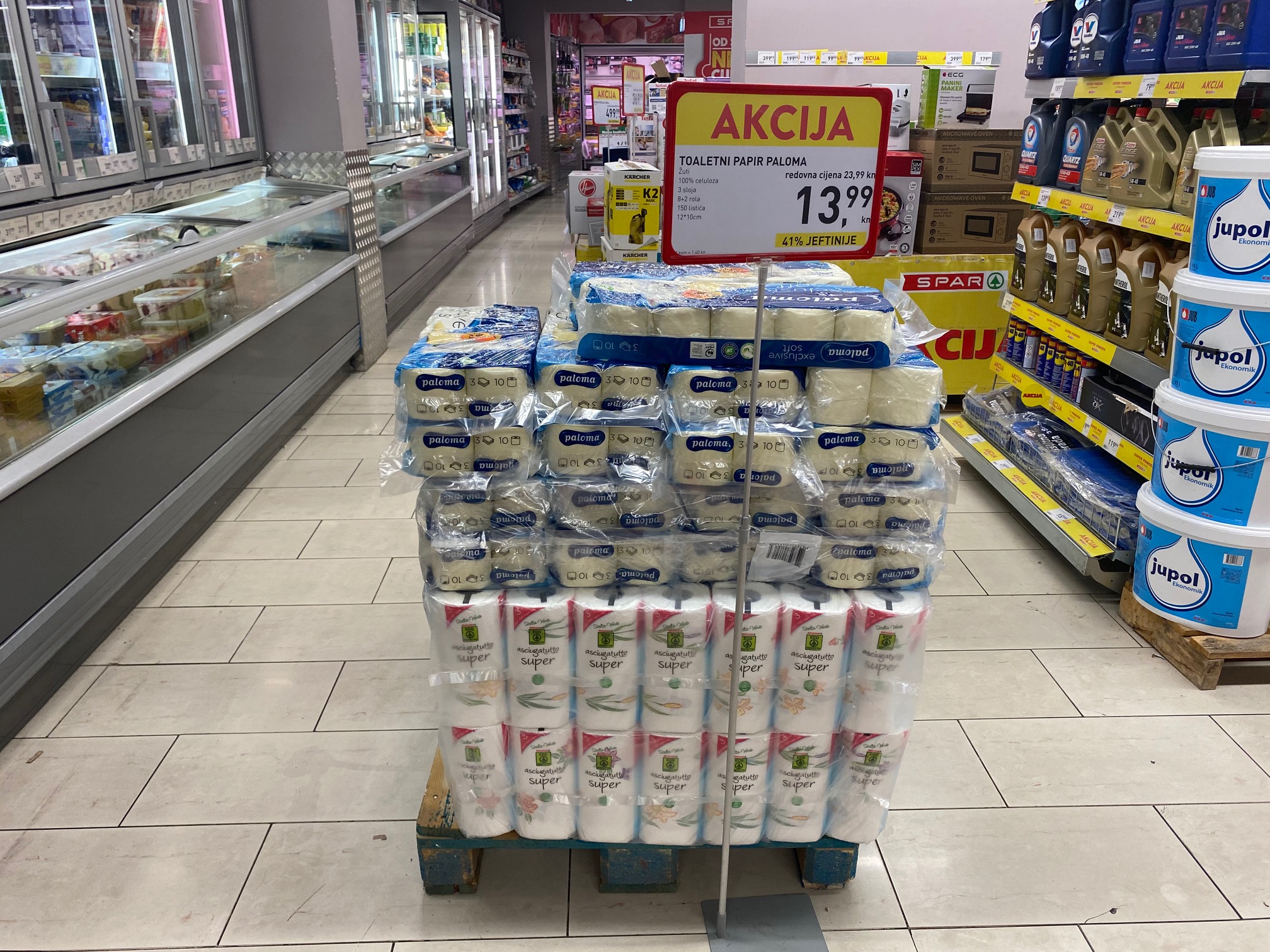
And there was still plenty available.
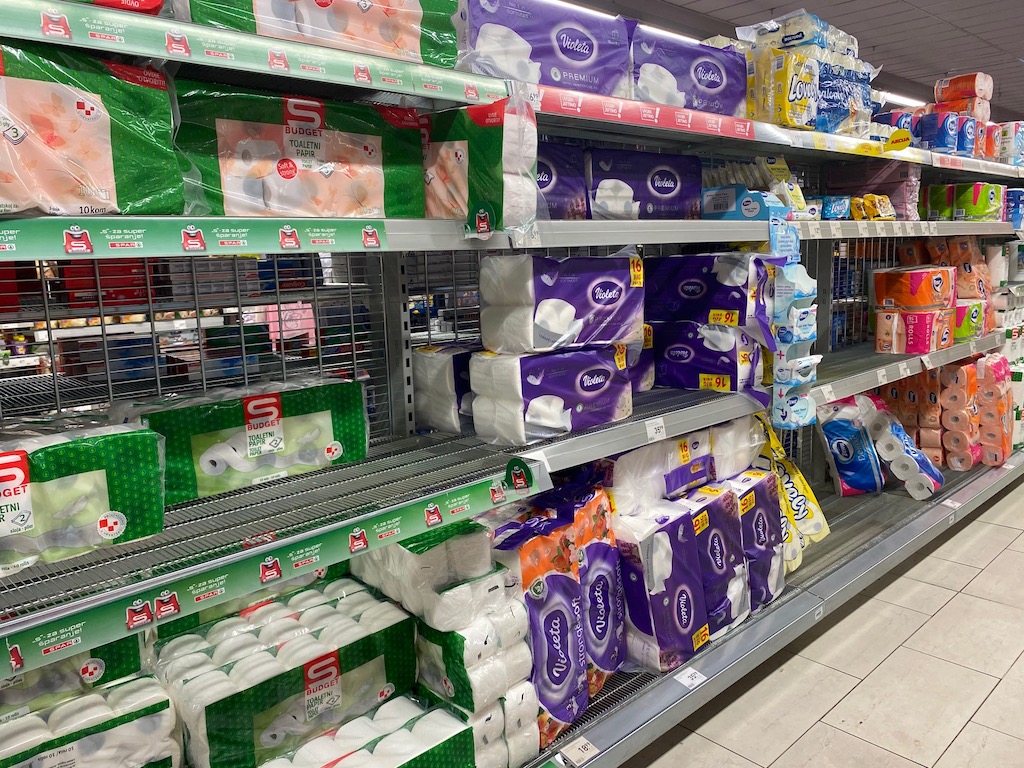

Some bottled water and milk brands could use a refill.
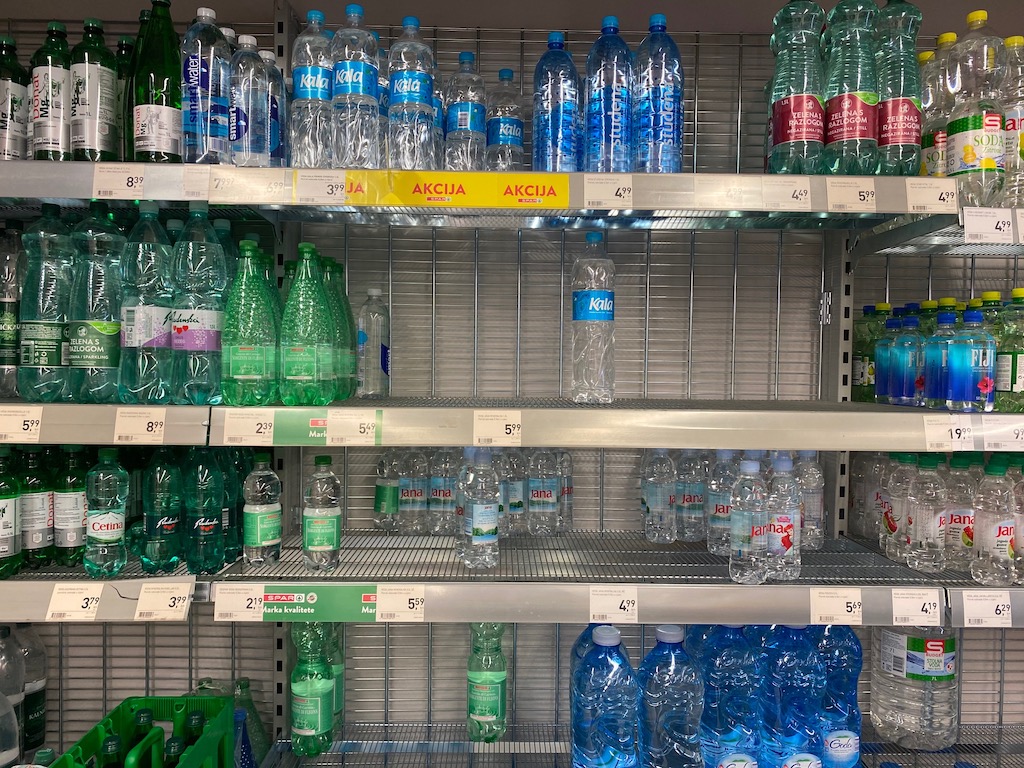
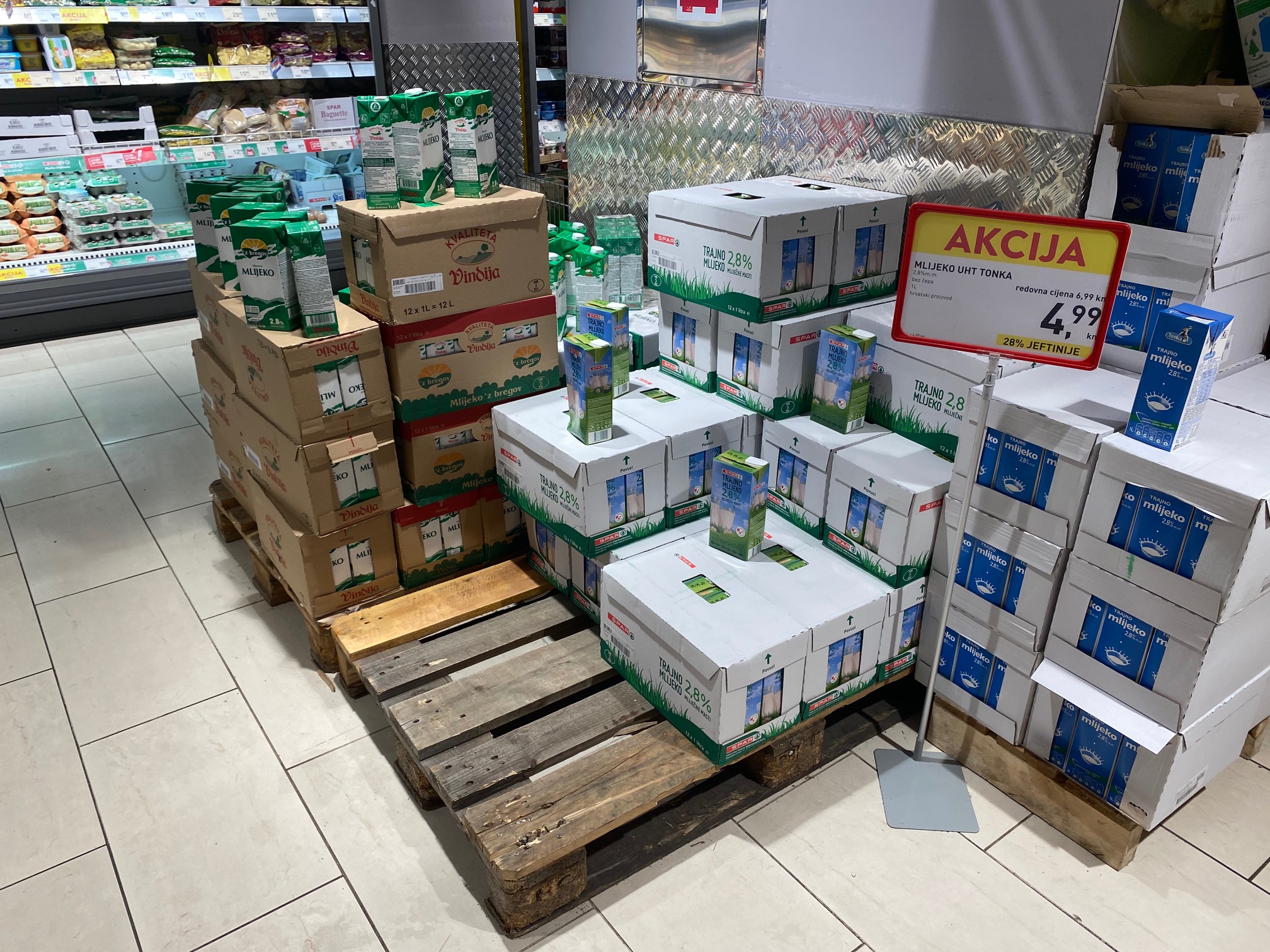
So, how was my self-isolation shopping Saturday in Split? Fortunately, I was able to acquire everything I needed, and shoppers out and about didn't seem panicked, nor did they buy in bulk. It was no busier than a typical Saturday morning shop in the Dalmatian capital.
What have you had trouble finding in Split? Send over your self-isolation shopping photos to This email address is being protected from spambots. You need JavaScript enabled to view it..
For the latest on the coronavirus crisis in Croatia, follow the dedicated TCN section.
Konzum Prepared, Issues Request to Croatian Coronavirus Stockpilers
Konzum, Croatia's largest retail chain, has stated that its stores and warehouses are adequately equipped, and enhanced hygiene and sanitation measures are being implemented in all shops, warehouses and administration buildings.
As Poslovni Dnevnik writes on the 13th of March, 2020, all of Konzum's warehouses and stores are well-equipped and supplies are stepping up, especially when it comes to groceries and products that customers are seeking the most during these circumstances, Konzum reports.
In this way, Konzum claims that it is fully prepared for increased demand across all of its stores and is taking all measures to respond to any future increase in demand.
"As we expect a further increase in purchases, we've stepped up to the mark and will continue to increase our product inventory. Our staff regularly will make sure the shelves are full and display the products, but we'd like to ask our customers for understanding and patience if some products aren't on the shelves at some point or another - this is only because we aren't getting them out onto the shelves quickly enough.
We focus on food and products that are currently in greatest demand, and some of them are additionally exhibited in store corridors, to make them even more accessible to customers. We're taking all possible measures so that our customers can procure whatever they consider necessary at the moment,'' stated Slavko Ledic, CEO of Konzum.
Konzum's supply chain in Croatia and abroad remains functional
Konzum's supply chain is also functioning well in these moments of growth of demand and all warehouses are well equipped, with additional increases. When it comes to delivering goods from areas such as Italy, Konzum has introduced additional controls on the process of importing goods and continues to follow the recommendations of the competent institutions. In the case of delivery restrictions from one or more countries, there are sufficient supplies of products to be able to continue to operate smoothly.
"In order to provide customers with the necessary supplies in the event of restrictions or interruptions in delivery from vulnerable countries, we're constantly looking for alternative sources of supply. We're placing the greatest emphasis on cooperation with Croatian suppliers, which has been a strategic priority in our operations from the very beginning, as well as in this current situation,'' said Slavko Ledic, CEO of Konzum. Croatian products account for more than 75 percent of Konzum's overall traffic, and in some fresh categories such as fruits and vegetables, meat, fish and bakery products, that figure rises to more than 80 percent.
Konzum has enhanced its safeguards to protect both customers and employees
In all Konzum shops, warehouses and in the administrative building, all preventive protection measures have been taken in accordance with the recommendations of the competent institutions. Thus, in addition to regular hygiene and safety procedures, enhanced hygiene and sanitation measures are being implemented in the supply chain, in shops and offices, as well as the regular disinfection of cash registers, equipment and POS devices.
In order to further protect the safety of both customers and employees, an operational crisis management team has been set up, whose members are available at any time of the day and in a very short time if needed. Procedures and instructions have been prepared for dealing with various possible coronavirus-related scenarios for employees across all stores, warehouses and office buildings.
"Consumers are at the forefront of the safety and health of customers and employees, and therefore we've introduced additional preventative measures to ensure that our customers can safely and seamlessly make their purchases. We'll continue to monitor the situation to respond appropriately should new circumstances arise that would require additional action,'' noted Ledic.
Online shopping
Online shopping is experiencing a huge increase in orders, and Konzum is taking every step possible to simplify the purchase and delivery process for customers and employees and to open as many delivery times as possible.
An additional update was made on Konzum's website to make the whole system function even under greater pressure. The focus is on the products most sought after by customers, but all major product categories are still covered. However, due to the increased number of orders, the Pickup service is not yet available, and the estimated delivery time currently stands at seven days. A number of new Delivery and Drive terms open every day, and Konzum would like to thank all of its customers for their understanding and continued patience.
Konzum has closed its comments by stating that it is constantly monitoring the further development of the situation as a company and it is ready to take additional measures in line with new information as and when needed.
Make sure to follow our dedicated page for more on coronavirus in Croatia.
NP Krka: “National Park Open, Acting in Accordance with Instructions”
As Morski writes on the 13th of March, 2020, the beautiful NP Krka has issued a statement to the general public stating that preventive measures are being taken to protect the health of visitors and that relevant information and guidelines are continually being monitored, on the basis of which further action will be taken if needed.
After the information on persons in the Republic of Croatia with whom the coronavirus has been confirmed became available to the public, NP Krka, a Croatian national park visited by countless people annually, undertook all necessary actions and activities possible in order to protect the health of visitors, employees, partners and associates.
All measures and procedures taken by NP Krka are in full accordance with the current recommendations and instructions of the Ministry of Health, the Croatian Institute of Public Health and the Civil Protection Staff of the park's ''home'' county - Sibenik-Knin.
Events due to have taken place/due to take place during March and early April at NP Krka have been delayed...
The events that were to take place at NP Krka in March and during early April have been postponed. This regards activities related to the celebration of World Water Day, due to fall on March the 22nd, and the holding of the third Krka Half Marathon, scheduled for April the 4th, which is usually attended by a large number of participants and visitors. The participation of the employees of NP Krka at tourist fairs in the Republic of Croatia and in foreign countries have also been cancelled.
The beloved national park remains open to visitors
Despite the current coronavirus situation, NP Krka remains open to visitors in accordance with the recommendations of the expert services. The Skradinski Buk and Roski Slap (Waterfall) locations with all of their associated presentation facilities can be visited daily from 09:00 to 17:00, as is customary for this time of year.
''We're also taking all necessary measures and we're doing everything in our power to protect not only visitors but also our employees, partners and associates during the regular activities of NP Krka. If there are any changes related to the work of the National Park, visitors will be informed in due time on NP Krka's website.
Finally, we'd like to emphasise that with responsible behaviour, acting in accordance with instructions and implementing preventive measures, we're protecting our own and others' health as well,'' read a statement from NP Krka.
Make sure to follow our dedicated page for all you need to know about coronavirus in Croatia.
Minister Maric Sends Out Message to Croatia's Coronavirus Panic Buyers
Croatian Finance Minister Maric has issued a message to Croatian panic buyers, and a similar message comes from Podravka which urges people to calm down.
Coronavirus (COVID-19) has sent people into somewhat of a meltdown, despite the numerous explanations and warnings from highly cited scientists such as Igor Rudan (which you can read here and here), that there is absolutely no need to panic. While these warnings go ignored by a significant number of people, shelves in certain shops are quickly running out of produce to fill them
Hand sanitiser and toilet paper seem to be high on the list of Croatia's numerous panic buyers concerned about the possibility of self-isolation and running out of said items.
''If any shelf ends up empty, we've got enough [products] to fill it back up again,'' stated Finance Minister Zdravko Maric in a message sent out to residents of the Republic of Croatia during a recent news conference, as Poslovni Dnevnik writes on the 13th of March, 2020.
"As far as the supply chain is concerned, there's enough of everything. Manufacturers and distributors have months to go… If any shelf is empty, there's enough to be able to fill it back up again,'' Minister Maric reassured.
"I have first hand information, we're talking about increased consumption. I repeat again: there are sufficient quantities of everything, and there will be for months to come. There's no need for excessive ''attacks'' on retail chains and the creation of additional and excessive inventory,'' Minister Maric added in an apparent warning to panic buyers who are leaving nothing for others.
"All production is working normally for us. We have several months of supplies, we've been preparing for the season so we will ensure the continuity of production, Croatia will not be left without food and medicine,'' said a statement from the large Croatian company Podravka, which also urged people to please not stockpile.
Make sure to follow our dedicated page for more on coronavirus in Croatia.
Lazaret, the Original Quarantine in Split
March 14, 2020 - As the coronavirus craze takes over Europe, it is good to remember that Split was once one of Europe’s leading quarantine cities.
Slobodna Dalmacija writes that it all started on the Lazaret Coast, where the Tourist Palace and taxi stand sit south of the Green Market (Pazar) today. It was here, at the end of the Middle Ages, that one of the most important commercial and health buildings on the Adriatic was built - the famous Split Lazaret.
During the periods of peace between Venice and the Ottoman Empire, with interruptions during the war years, Dalmatian cities were essential import and export ports of the Venetian-Ottoman trade: business flourished in the Republic of Dubrovnik, the Turkish Neum, but the liveliest was often in Split.
The European standard was clear - large ports had lazarets (named after St. Lazarus, the patron saint of the sick), where not only the loading and unloading of goods took place, but also the disinfection in times of frequent plagues. Namely, a strict and mandatory 40 days of quarantine were put in place in order to detect and prevent possible contagion.
The city's port, the busiest of all on the eastern Adriatic coast, lacked adequate space for these jobs. The goods were stored in the cellars of Diocletian's Palace, but the isolation of citizens from infrequently infected Eastern goods was poor.
Therefore, in the 16th century, a plan was developed to build a spacious and important lazaret for the citizens.
The draft was made by Daniel Rodriguez (Rodrigo), a Venetian Jew of Portuguese descent.
Seeing that the Turks wanted to establish its own lazaret at the mouth of the Neretva, as did the people of Dubrovnik, the Venetian Republic accepted his plan. In 1580, Rodrigo began with his own means of building a quarantine, a lazaret, and then the state continued, but under his supervision.
But everything has its price. According to art historian Dr. Dusko Keckemet, as compensation for his plan and expense, Rodrigo demanded that the Venetian Republic receive a colony of Jews exiled from Spain to Marjan, according to which its laws were much more lenient than other European countries that did not favor them.
The settled Sephardic Jews were given a part of the settlement within the walls of the Palace, an area whose name we have inherited through the informal toponym 'Get', and their successors over the centuries have left a large mark. The Lazaret of Split attracted abundant goods, not only from the Middle East but also from the Far East. Therefore, Split bore the prestigious title - 'the golden ring between the East and Venice'.
The space was rebuilt several times, and relatively quickly became one of the best-equipped lazarets in Europe at the time.
Dr. Kecskemet states that it exceeded the length of the facade of Diocletian's Palace in size.
It was about 200 meters long and about 100 meters wide.
Protective health regulations were stringent, but they did not always prevent infectious diseases. Before the quarantine was built, epidemics of "black death" were more frequent in Split, in the 14th, 15th and 16th centuries, but after the lazaret was built, they were less frequent. They were recorded in 1607, 1731, 1763 and last in 1784. The extent of the tragedy is evidenced by the fact that between March 29 and July 30, 1784, 1264 people died and the city had only a few thousand inhabitants at that time.
The lazaret had several courtyards with wells running sulfuric water for rinsing goods, health workers, security guards, caravan barns and warehouses for goods. It also included the church of Sv. Roko, which was affected by epidemics, especially plague, and a special room for conversations of isolated people with the outside world.
According to Professor Snjezana Perojevic from the Department of Construction Heritage at the Faculty of Civil Engineering, Architecture and Geodesy, goods suitable for the transmission of infection were subjected to a rigorous disinfection process, which was carried out in three primary ways: aeration, immersion, and boiling.
Washing was performed in water with vinegar or in the sea. The animals were also washed with vinegar water and had to go through the pools before entering the village. All textile raw materials, leather, fur, woven and knitted fabrics, carpets, bedspreads and even tobacco were ventilated.
The job of a disinfectant is also fascinating, as they had to spend the prescribed quarantine time with the goods and inspect it with their bare hands. After all, their good health was considered a guarantee that the goods were not infected.
Travelers arriving from the East had to spend forty days in quarantine.
Caravan traffic declined drastically in the nineteenth century, with the development of steamboats and the construction of the first modern roads to the hinterland, which was then bounded by the current border with BiH, then between the Austrian and Ottoman Empire.
Lazaret thus was transformed for the military, customs and financial purposes, and the wooden Veseljković theater was built in one of the courtyards.
Part of the space was later converted into city prisons where citizens were imprisoned until the capitulation of fascist Italy.
At the beginning of the 20th century, the citizens of Split intended to demolish the old lazaret and thus release a better view of the Diocletian's Palace from the sea.
Neither citizens nor conservationists considered it a cultural monument; such status was reserved for church and residential buildings.
As Professor Perojevic pointed out in her work, the importance of the lazaret exceeded the economic benefit, which was modest for the city. Its meaning was more social, because while the lazaret was active in Split, it was where different civilizations came together.
The first city hospital in Split was founded in 1783 by the will of the Ergovac brothers and was housed inside the Cornaro bastion.
It bore the name of St. Lazar, and was later renamed Civil Hospital. Due to significant needs, the construction of a new hospital on the outskirts of the city was sought, for which plans were made as early as 1905 but were not realized due to World War I.
With the interest of Dr. Jaksa Racic, director and then mayor, the construction of a new hospital complex at Firule began in 1931. According to scientist Livia Brisky, his first pavilion was intended to treat infectious patients.
On the hill we today call Lazarica, an infectious ward was opened in 1933.
From April 1941 data, the much larger pavilion at Firule, demolished 15 years ago to build a new maternity ward, had 62 beds and 15 cradles. As early as 1942, it was said that the infectious ward needed urgent reconstruction, and at that time, three doctors, two nurses, one analyst and six nurses worked there. On June 3, 1944, the Firule building was bombed and needed immediate rehabilitation.
The relocation of the General Hospital began in 1975 in a new complex at Firule, whose first facilities were built in 1939.
You can read more about the 16th-century Split Lazaret on TCN.
To read more about lifestyle in Croatia, follow TCN's dedicated page.
HNB Plans Structural Operation, Purchase of State Bonds to Ease Fallout from Coronavirus
ZAGREB, March 14, 2020 - The Croatian National Bank (HNB) on Friday said that the growth of the country's GDP would probably deviate from the initial forecasts to a considerable degree due to the outbreak of coronavirus, and the bank will take measures to help the economy to overcome the situation.
One of the measures which the HNB is going to conduct is a structural operation for five years at the interest rate of 0.25%, and this will be carried out on Monday, 16 March.
In addition, the HNB has started buying state bonds with the aim of maintaining stability on the market of state securities, the HNB Council said in a press release on Friday after the council's meeting.
On Thursday, the HNB stated that "in accordance with the communication of competent institutions so far, with the aim of preventing the coronavirus disease spreading, and in compliance with the measures undertaken at the level of the Republic of Croatia, the CNB (HNB) has started the implementation of measures, which apply to its key tasks, employees, business processes and business premises, that basically ensure the smooth and regular performance of all the key functions of the Croatian central bank, as well as of credit institutions supervised by the CNB."
"The measures are simultaneously directed at minimising the risk of contagion with the COVID-19 virus and its spreading."
If needed, the central bank will also apply appropriate and timely measures to ensure the continuity of work of its Council, i.e. the continuity of operational decision-making at the level of the central bank.
Supervisory requirements were sent to banks for the introduction of measures for a smooth and safe operation in epidemic conditions.
Within its supervisory function, the HNB "continuously monitors the operation of credit institutions with the main objective to maintain confidence in the banking system and promote and safeguard its safety and stability."
More coronavirus news can be found in the Lifestyle section.
ZSE Indices Recover at End of Another Bad Week
ZAGREB, March 14, 2020 - The main Zagreb Stock Exchange (ZSE) indices on Friday increased by approximately 6%, recovering in part after the previous day's losses which exceeded 10%, however, on the weekly level they sank for the third week in a row, by nearly 17%.
On Friday, the Crobex index rebounded by 5.78% to 1,512 points, and the Crobex10 by 6.04% to 902 points. All sector indices were in the green today, and the building sector increased the most, by 8.26%.
The main stock exchange indices recouped a part of the previous day's losses, when they sank by more than 10% in the first minutes of trading, to their lowest levels in the last 11 years. Consequently, the ZSE suspended trading for an hour yesterday, and afterwards, the Croatian Financial Services Supervisory Agency (HANFA) decided to suspend trading until the end of the day.
Including the previous day's decrease, the ZSE indices plunged by 16.9%, and, consequently, around HRK 13.8 billion of stock market value was deleted from the stock exchange.
On Friday morning trading was resumed, and in the course of the day indices soared by up to 7.5%. Their recovery today was for the largest part stimulated by the recovery of stock prices at the European stock exchanges, which followed yesterday's record fall, and which was influenced by investors' hope that the measures adopted by a series of central banks and governments in the world would mitigate the impact of the coronavirus pandemic on the economy.
At the Zagreb Stock Exchange, regular turnover reached HRK 52.9 million, and almost HRK 53 million was realised in block trading.
The Adris Group stock realised HRK 35 million in regular trading, followed by the Valamar Riviera hotel group stock (HRK 8.5 million), the Podravka food and pharmaceutical company stock (HRK 3.35 million), Končar Electrical Industry (HRK 3.23 million), and Arena Hospitality Group (HRK 2.86 million).
The HT Telecom stock was the most liquid in regular turnover, realising HRK 9.24 million, with its price rising by 3.73%, to HRK 153 per share.
The Valamar Riviera hotel group stock turned over HRK 8.3 million, and its price increased by 10.68% to HRK 22.8 per share.
The Podravka food and pharmaceutical company stock turned over HRK 6.83 million, and its price skyrocketed by 16.56% to HRK 373 per share, making it the winner among the most liquid stocks.
More business news can be found in the dedicated section.

